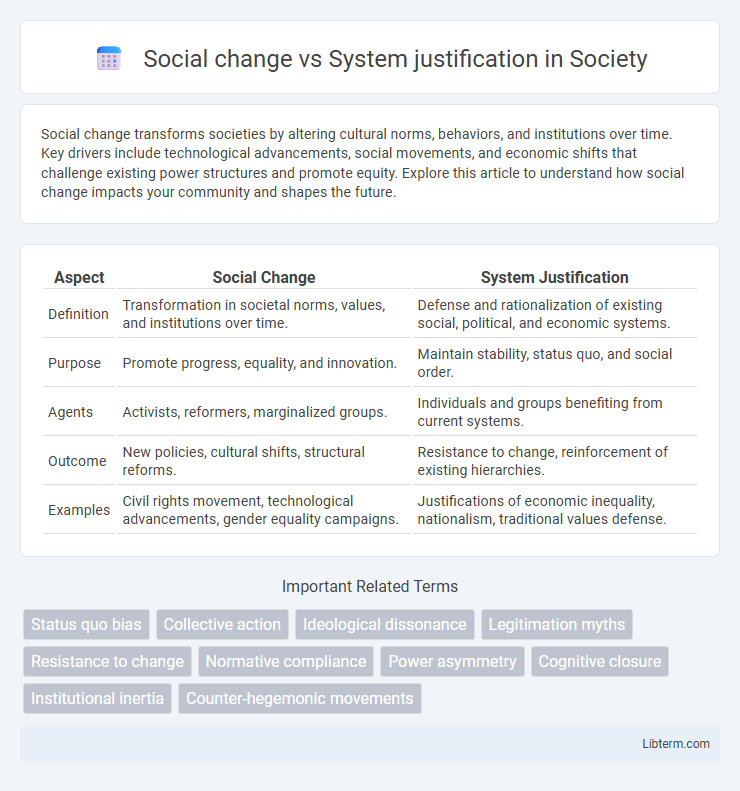Social change transforms societies by altering cultural norms, behaviors, and institutions over time. Key drivers include technological advancements, social movements, and economic shifts that challenge existing power structures and promote equity. Explore this article to understand how social change impacts your community and shapes the future.
Table of Comparison
| Aspect | Social Change | System Justification |
|---|---|---|
| Definition | Transformation in societal norms, values, and institutions over time. | Defense and rationalization of existing social, political, and economic systems. |
| Purpose | Promote progress, equality, and innovation. | Maintain stability, status quo, and social order. |
| Agents | Activists, reformers, marginalized groups. | Individuals and groups benefiting from current systems. |
| Outcome | New policies, cultural shifts, structural reforms. | Resistance to change, reinforcement of existing hierarchies. |
| Examples | Civil rights movement, technological advancements, gender equality campaigns. | Justifications of economic inequality, nationalism, traditional values defense. |
Understanding Social Change: Definition and Drivers
Social change refers to significant shifts in societal structures, cultural norms, and collective behavior driven by factors such as technological advancements, economic developments, and social movements. System justification theory explains the psychological processes by which individuals defend and rationalize existing social, economic, and political institutions, often resisting social change. Understanding these drivers highlights the tension between the push for reform and the human tendency to preserve stability within established systems.
What Is System Justification Theory?
System Justification Theory explains the psychological process where individuals defend and rationalize existing social, economic, and political systems, even when these systems may be oppressive or unjust. This theory highlights why people, including those disadvantaged by such systems, often resist social change by perceiving the status quo as fair, legitimate, and inevitable. The tension between system justification and social change reveals challenges in mobilizing collective action to transform entrenched institutional structures.
Psychological Roots of System Justification
Psychological roots of system justification involve the human need for cognitive consistency, which drives individuals to defend and rationalize existing social, economic, and political systems, even when these systems perpetuate inequality or injustice. This motivation stems from a desire to reduce uncertainty and threat by perceiving the status quo as fair, legitimate, and stable. System justification theory highlights how this psychological mechanism can undermine social change by causing people to resist challenges to entrenched power structures and maintain the social order.
Social Change Agents: Who Challenges the Status Quo?
Social change agents, including activists, reformers, and marginalized groups, challenge the status quo by advocating for systemic transformations that address social inequalities and injustices. These agents employ strategies such as protests, policy advocacy, and grassroots organizing to disrupt established social orders that system justification perpetuates by reinforcing existing power structures and resisting change. Their efforts create critical dialogues and actions that confront deeply ingrained beliefs, enabling progressive social evolution.
Resistance to Social Change: Motivations and Mechanisms
Resistance to social change often stems from system justification, where individuals defend existing social arrangements to maintain a sense of stability and control. Motivations include fear of losing status, economic security, and cognitive dissonance associated with challenging deeply held beliefs. Mechanisms involve selective exposure to information, derogation of change agents, and reinforcement of prevailing norms to preserve the status quo.
System Justification and Social Inequality
System justification theory explains how individuals defend and rationalize existing social, economic, and political structures even when these systems perpetuate social inequality. This psychological process leads to the acceptance of unequal distributions of resources and opportunities, reinforcing social hierarchies and hindering efforts toward social change. By maintaining legitimacy for the status quo, system justification contributes to the persistence of poverty, discrimination, and unequal access to education and healthcare.
Media Influence: Framing Social Change and System Loyalty
Media influence significantly shapes public perception by framing social change narratives that either highlight systemic inequalities or reinforce existing power structures. Framing techniques emphasize collective action and injustice to mobilize support for reform, while alternatively promoting stability and order to justify system loyalty. These contrasting media frames affect audience attitudes, either encouraging resistance against status quo or reinforcing compliance with prevailing social systems.
Collective Action vs. System Preservation
Collective action drives social change by mobilizing individuals to challenge existing power structures and advocate for equity, disrupting systemic inequalities. System justification theory explains the psychological mechanisms that lead individuals to defend and rationalize the status quo, even when it perpetuates injustice. The dynamic tension between the transformative potential of collective activism and the stabilizing force of system preservation shapes the trajectory of social movements and institutional reform.
Case Studies: Historical Examples of Social Change and System Justification
Historical examples reveal how social change challenges entrenched system justification, such as the Civil Rights Movement in the United States undermining segregation laws upheld by systemic racism. The fall of apartheid in South Africa demonstrates how sustained activism disrupted institutionalized racial hierarchies justified by the ruling regime. These case studies illustrate the dynamic tension between collective action for social reform and psychological mechanisms that defend existing social orders.
Strategies to Promote Social Change in Resistant Systems
Promoting social change in resistant systems involves tactics such as raising awareness through education campaigns that challenge prevailing beliefs and norms supporting the status quo. Mobilizing collective action by empowering marginalized groups to voice their concerns disrupts system justification by highlighting systemic inequalities. Implementing policy reforms alongside grassroots advocacy creates institutional pressure, fostering gradual shifts in entrenched social structures.
Social change Infographic

 libterm.com
libterm.com